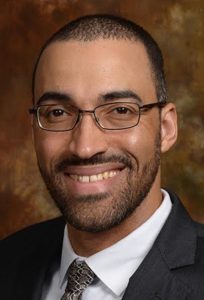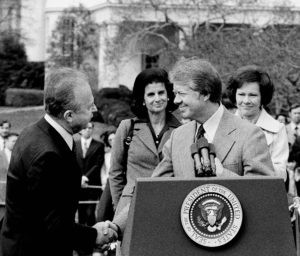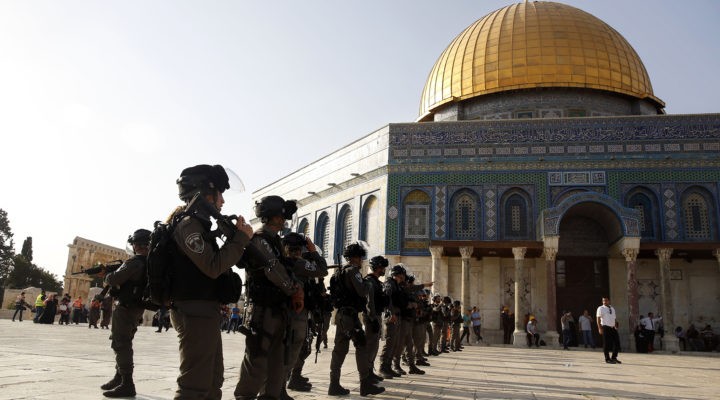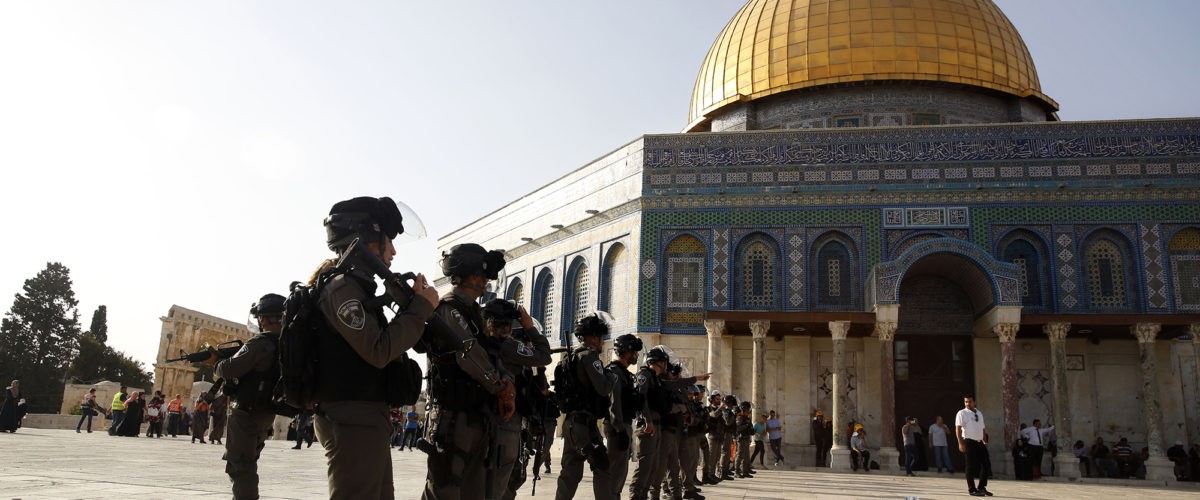On the evening of July 16, 2017, I boarded an 11-hour flight to Tel Aviv, Israel. It was my first trip to what has been known for years as the Holy Land, as part of a clergy contingent sponsored by the Jewish Community Relations Council.
The agenda for the week we spent there was part religious pilgrimage and part political orientation. To be sure, the political orientation had an agenda to it: the organizers of the trip were hoping that those of us who went to Israel thinking we knew the Palestinians were right and Israel was wrong would come back uncertain about that position. They were hoping that our critique of Israel’s behavior toward the Palestinians would be complicated at least, if not entirely neutralized.

Paul Robeson Ford
I was under pressure from some of the activist organizations I worked with at the time not to go on the trip because of the perception that I was aiding and abetting pro-Israel propaganda; but I knew in my spirit that I was supposed to go. I knew how important the land of Palestine was to my faith as a Christian and my lineage as a clergyman, pastor and preacher. I knew, too, that the truth of who was right and who was wrong probably was more complicated than the sound bites that disparate media outlets — both domestic and global — pushed out to consumers like myself.
I also desperately needed a retreat to a place filled with such power and purpose given the calling that I had accepted in my life 20 years prior. I sensed this would be a life-changing experience for me — both religiously and politically; I was not disappointed.
I was baptized in the Jordan River, and I baptized others who felt led like I did to reaffirm their faith and commitment to this gospel work.
I swam in the Sea of Galilee.
I walked the streets of Jerusalem. I prayed at the Western Wall.
As Pentecost approaches this Sunday, the land of Palestine has been weighing on my heart, as memories of my experience have been flooding back amidst news of the terrible violence that has descended into war. If you read some of the recent news clippings, you may notice a reference to this being the most intense fighting since the summer of 2017, when the killing of two Druz soldiers outside the Al-Aqsa Mosque sparked weeks of unrest and violence.
I remember the situation distinctly because I was in Jerusalem when it happened, and it disrupted the plans we had made to visit Bethlehem, where Jesus was born, and to walk the Via Dolorosa, the road Jesus walked on his way to Golgotha.
“The Holy Land never will live up to its name until everyone there — Palestinians and Jews — makes a decision to be peacemakers.”
What did become clear to me from my time in the Holy Land is that the Holy Land never will live up to its name until everyone there — Palestinians and Jews — makes a decision to be peacemakers, by any means necessary. The land that means everything to three major religions of the world — Christianity, Judaism and Islam — never will realize its full potential as a sacred and sanctified space until members of all three of those faiths decide to lay aside the concerns of the flesh and devote themselves to the work of the Holy Spirit that Scripture reports descended with unifying force 2,000 years ago this weekend.
The Holy Land never will live up to its name because there is too much hurt. There is too much pain. There are too many families that have lost loved ones. There are too many widows of war. There are too many children who have been orphaned by violence and terrorism. There are too many people who have been radicalized to the point that they are unable to think rationally, and morally, or with any deference to the ultimate concerns of life.
What should be clear to all of us is that the Palestinian people are oppressed, and they have been and continue to be dispossessed of their land like the indigenous people of the United States. Palestinians are treated as second-class citizens. Arab Israelis have been niggerized in that country, and they overpopulate the ranks of the unemployed and the incarcerated there in the same way that Black people do here.
There is also much that could be said about the plight of Israel’s Ethiopian Jews, who were finally claimed by Israel some time ago after years of racist resistance to the idea that Black people could be chosen ones, too. As for Bibi Netanyahu, the people of Israel seem too afraid of the wages of their own injustice toward the Palestinians to put him out of office, no matter how many elections they have in that country.
But it’s also time for those who are chanting “death to Israel” to stop. It is time for a two-state solution; it is time to stop threatening the very existence of a people who think every day about the 6 million of their own who were sent to the gas chambers less than a hundred years ago just because they were Jewish. I have walked the halls of the Holocaust Museum, and I have left in tears.
“The politics of the Holy Land are killing people, and there seems to be no end in sight.”
Israel has a right to exist.
And the Palestinians have a right to live in a land of equity, and justice, and opportunity. They have a right to live on the land that their ancestors did. As Black people, we must see the plight of Palestinians as our own, and we must position ourselves to be in radical solidarity with them as they struggle for freedom.
If Jesus stands with the sick and afflicted, the thirsty and the naked, the stranger and the prisoner, then Jesus stands as well with the people of Gaza, and with the Palestinians being displaced in the West Bank. If Christ is Black — as James Cone argued so persuasively — then Christ is Palestinian, too.
The commemoration of the Holy Spirit’s arrival on Pentecost has direct implications for how we live — here and now — and it resonates clearly with the situation that confronts us today in the Holy Land that is made persistently unholy by the endless violence and trauma that plagues that place. The politics of the Holy Land are killing people, and there seems to be no end in sight.

President Jimmy Carter shakes hands with Israeli Prime Minister Yitzhak Rabin as his wife, Leah, and First Lady Rosalynn Carter watch during South Lawn arrival ceremonies at the White House in Washington, March 7, 1977. (AP Photo)
I am old enough to remember the last chance the Holy Land really had for peace. And it was during the years that the Israeli government was led by a man named Yitzhak Rabin. He was an imperfect leader, to be sure, but he had decided to be a peacemaker, as Jesus directed all of us to do: “Blessed are the peacemakers, for they shall be called the sons and daughters of God.”
And then Rabin was assassinated, not by a Palestinian militant, not by an operative from Hamas or Hezbollah, but by one of his own people — a radicalized Jewish Zealot, who decided Rabin was a threat to their safety in and control of the Holy Land.
One of his own took him out!
It always has been the enemy within who has been the greatest opponent to our hopes for freedom for the oppressed, release to the captives and peace-with-justice for all people.
The ones who are seeking to walk in the spirit of Yitzak Rabin are intentionally crossing over between the places where their people are and the places where the other people are; they are intentionally confronting their own prejudices and assumptions about the “other people,” whether they be Jewish or Palestinian; they are listening to each other — deeply — and they are pushing open the door (ever so slightly) to the possibility of forgiveness and reconciliation. The ones I speak of — who we met on that trip — are seeking to be the light of the world. And they are the only hope for that land to be holy.
I’ll be forever grateful to JCRC for the opportunity to visit the land that still seeks to be holy. And yet I am convinced that Israel is wrong in the way it treats Palestinians and Arabs, in the disproportionate loss of life it extracts in times of war such as these, and in the fear that it allows to rule its politics. Ultimately, it is the responsibility of the privileged and the powerful to make peace-with-justice; this is not the burden of the powerless and oppressed.
The biblical story of Pentecost suggests that the moment when the Holy Spirit descended changed hearts and minds and inspired right action that was in line with the politics of Jesus and the care of the marginalized in their midst. This is the Pentecost I’m praying for this weekend. This is the Pentecost that can make that land holy.
Paul Robeson Ford serves as senior pastor of First Baptist Church (Highland Avenue) in Winston-Salem, N.C. He was born and raised in New York City and grew up at the Riverside Church under the leadership of James A. Forbes Jr. He received a master of divinity degree from the Divinity School at the University of Chicago, where he is now a candidate for the Ph.D. in theology.
Related articles:
Apartheid in Palestine and a Christ who stands on the other side of the wall | Analysis by Chris Conley
Trump’s Middle East peace plan makes sense until you read it, Christian peace activist says
Baptist convention denounces ‘oppression and violence’ toward Palestinians


